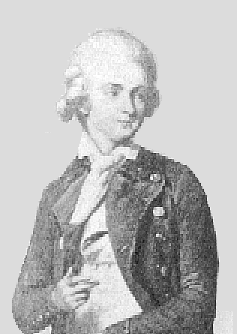Paolo
Greppi (1748-1800)
 Paolo
Greppi (1748-1800) was born into an ancient family of the Lombard minor nobility,
it not being until 1778 that the title of Count was granted by Maria Teresa
to Antonio, the true architect of the family's immense fortune and the father
of Paolo. While he was still a minor, and after he had studied in Vienna,
his father gave him his start in business as an associate of the commercial
house of Agazzini, which was based in Cádiz. In 1769 Paolo Greppi,
with partners who changed over the years, established a new company, which
ran with fluctuating, but on the whole good, fortune until 1799. Before very
long Greppi combined this activity with diplomacy, being named Consul-General
of the Empire in Cádiz (1774), Consul of the Republic of Ragusa (1782)
and of the Grand Duchy of Tuscany; as Imperial Consul he was also senior member
of the consular body in Cádiz. Curious and open to the new ideas of
the century, he became firm friends with many of the major personalities of
the time, among them Francesco Melzi d'Eril. In Cádiz,
after secretly marrying Rita María Díaz y Vivas, Paolo associated
mainly with the Italians who lived there with him - in particular Federico
Gravina and Alexandro Malaspina; he maintained a correspondence
with the latter for the whole of his life.
In 1788 he moved to Madrid in order
to devote more attention to the public connections required for his own business affairs, and in 1791, because of political circumstances in Europe, decided to return
to Italy, though not without first visiting Paris and Vienna. In Lombardy, which
was by this time constituted as a republic, he was esteemed highly by Napoleon,
however much he was disliked by those who supported more radical tendencies,
yet he took the opportunity to withdraw from his direct political responsibilities,
preferring to move to Tuscany and to continue privately to observe and to
discuss with friends (among whom were Federico Manfredini and Nicólas
de Azara) developments in European politics. In 1799 Greppi moved to Paris,
although about this period we have little information; nevertheless, we do
know that he agreed to join the Financial Commission of the Consulship of
the Cisalpine Republic, a post that he occupied for only two months, since
he died, in Paris, on September 14, 1800. From 1796 on, he attempted through
various channels to secure the release of Malaspina.
Paolo
Greppi (1748-1800) was born into an ancient family of the Lombard minor nobility,
it not being until 1778 that the title of Count was granted by Maria Teresa
to Antonio, the true architect of the family's immense fortune and the father
of Paolo. While he was still a minor, and after he had studied in Vienna,
his father gave him his start in business as an associate of the commercial
house of Agazzini, which was based in Cádiz. In 1769 Paolo Greppi,
with partners who changed over the years, established a new company, which
ran with fluctuating, but on the whole good, fortune until 1799. Before very
long Greppi combined this activity with diplomacy, being named Consul-General
of the Empire in Cádiz (1774), Consul of the Republic of Ragusa (1782)
and of the Grand Duchy of Tuscany; as Imperial Consul he was also senior member
of the consular body in Cádiz. Curious and open to the new ideas of
the century, he became firm friends with many of the major personalities of
the time, among them Francesco Melzi d'Eril. In Cádiz,
after secretly marrying Rita María Díaz y Vivas, Paolo associated
mainly with the Italians who lived there with him - in particular Federico
Gravina and Alexandro Malaspina; he maintained a correspondence
with the latter for the whole of his life.
In 1788 he moved to Madrid in order
to devote more attention to the public connections required for his own business affairs, and in 1791, because of political circumstances in Europe, decided to return
to Italy, though not without first visiting Paris and Vienna. In Lombardy, which
was by this time constituted as a republic, he was esteemed highly by Napoleon,
however much he was disliked by those who supported more radical tendencies,
yet he took the opportunity to withdraw from his direct political responsibilities,
preferring to move to Tuscany and to continue privately to observe and to
discuss with friends (among whom were Federico Manfredini and Nicólas
de Azara) developments in European politics. In 1799 Greppi moved to Paris,
although about this period we have little information; nevertheless, we do
know that he agreed to join the Financial Commission of the Consulship of
the Cisalpine Republic, a post that he occupied for only two months, since
he died, in Paris, on September 14, 1800. From 1796 on, he attempted through
various channels to secure the release of Malaspina.
For more information, see:
G. GREPPI, La Rivoluzione Francese nel carteggio di un osservatore italiano
(Paolo Greppi), Milan, Hoepli, 1900-1904, voll. 3.
E. GREPPI, "Il conte Antonio Greppi (1722-1799), imprenditore, finanziere,
diplomatico nella Lombardia austriaca del Settecento," Archivio Storico
Lombardo, CXXI (1995), Milan, Cisalpino, 1996, pp. 399-429.
G. LIVA, "L'Archivio Greppi e l'attività della filiale di Paolo
Greppi a Cadice nella corrispondenza commerciale (1769-1799)," Archivio
Storico Lombardo, CXXI (1995), Milan, Cisalpino, 1996, pp. 431-487.
AA.VV., "Finanza e politica nell'età di Maria Teresa: Antonio Greppi
(1722-1799)," Archivio Storico Lombardo, CXXII (1996), Milan, Cisalpino,
1997, pp. 137-399.
Image courtesy of the Centro
di Studi Malaspiniani, Mulazzo, Italy. Biographical and
bibliographical notes by Dario Manfredi (Italian version),
translated by John Black.
